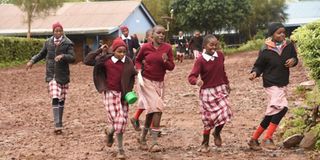Crusaders want anti-FGM lessons in school curriculum

Pupils of Kibiko Primary School in Kajiado County in a photo taken on January 13, 2020.
What you need to know:
- Anti-FGM crusaders in the country are now pushing to have Anti-FGM lessons introduced in Grade One and Two in the school curriculum.
- Move comes even as the Public Service and Gender ministry and Anti-FGM Board recently embarked on a new strategy of roping men in the campaign.
- The Anti-FGM Board, Unicef-Kenya, MenEndFGM and WomanKindKenya recently trained 40 male champions in Saka, Balambala in Garissa County.
Anti-Female Genital Mutilation (FGM) crusaders in the country are now pushing to have Anti-FGM lessons introduced in Grade One and Two in the school curriculum.
This strategy they say, will educate the young girls to say ‘No’ to the outlawed cultural practice being conducted against them.
“We cannot only use the law to end FGM. We have to use community dialogues to declare FGM unwanted. The age of cutting has reduced. Girls are now cut while very young and that’s why we are pushing to have anti-FGM lessons in Grade One and Two in the school curriculum,” said Nyerere Kutwa the board’s program manager.
He spoke in Nyamira County during the unveiling of the county’s anti-FGM steering committee recently. The move comes even as the Public Service and Gender ministry and Anti-FGM Board recently embarked on a new strategy of roping men in the campaign.
Hotspot FGM counties
The strategy entails the government recruiting and training male champions to spearhead advocacy and recruit other men to campaign against FGM in their respective communities in the 22 hotspot FGM counties.
The Anti-FGM Board in partnership with Unicef-Kenya, MenEndFGM and WomanKindKenya recently trained 40 male champions in Saka, Balambala in Garissa County. The men are expected to target convince the girls to reject demands by their parents and grandparents to undergo the cut.
The champions will also take lead in spearheading advocacy aimed at ending child marriages in their respective communities.
They have also been tasked with recruiting other men to campaign against FGM and child marriages.
“We have to end FGM completely and, therefore, need to be serious and work together in ending the vice by 2022. It has many negative effects and has no known social value in our society,” said Bernard Ole Kipury, Garissa Deputy County Commissioner.
Sadia Hussein an FGM survivor, said women deserve to enjoy their womanhood and not be traumatised by the society or individuals for not practicing the outlawed practice.
National prevalence
“God created us right and none should practice FGM to be accepted by the society,” she said.
FGM prevalence in Garissa County is at 98 per cent — the highest in the country. Comparably, the national prevalence stands at 21 per cent, according to the 2014 Kenya Demographic and Health Survey.
Anti-FGM Board Chief Executive Officer Bernadette Loloju called on communities to involve county leaders and men as they give leadership even at household level.
“Charity begins at home and as the new champions against FGM, the best place to start is at home and in your villages to stop FGM and that will make a difference in the community and the nation,” said Maryam Abdirahman, Programs Coordinator at WomanKindKenya.
The Executive Director of MenEndFGM Mr Tony Mwebia said no type of FGM is legal and should not be cordoned.
Gender issues
“Let us all join chiefs, sheikhs and other individuals to stop FGM, said Mr Mwebia.
Taita Taveta Deputy County Commissioner Emily Nyakundi noted that in the past, gender issues were left to women but today, men are fully involved in gender issues.
“There should be no kangaroo court in matters of gender and more so, those touching on FGM,” she said.
While speaking in Narok recently, Ministry of Public Service and Gender Chief Administrative Secretary Rachel Shebesh called for the application of the law even as other strategies are implemented to end FGM.
“A law is a law. Children are the responsibility of the government. Our role together with the board is to protect girls from harmful practices,” said Ms Shebesh.
Communities including the Maasai, Somali, Kisii, and Samburu bear the brunt of this violation declared illegal in 2011. Nonetheless, it is still practiced in secret, violating the rights of thousands of girls and women.





